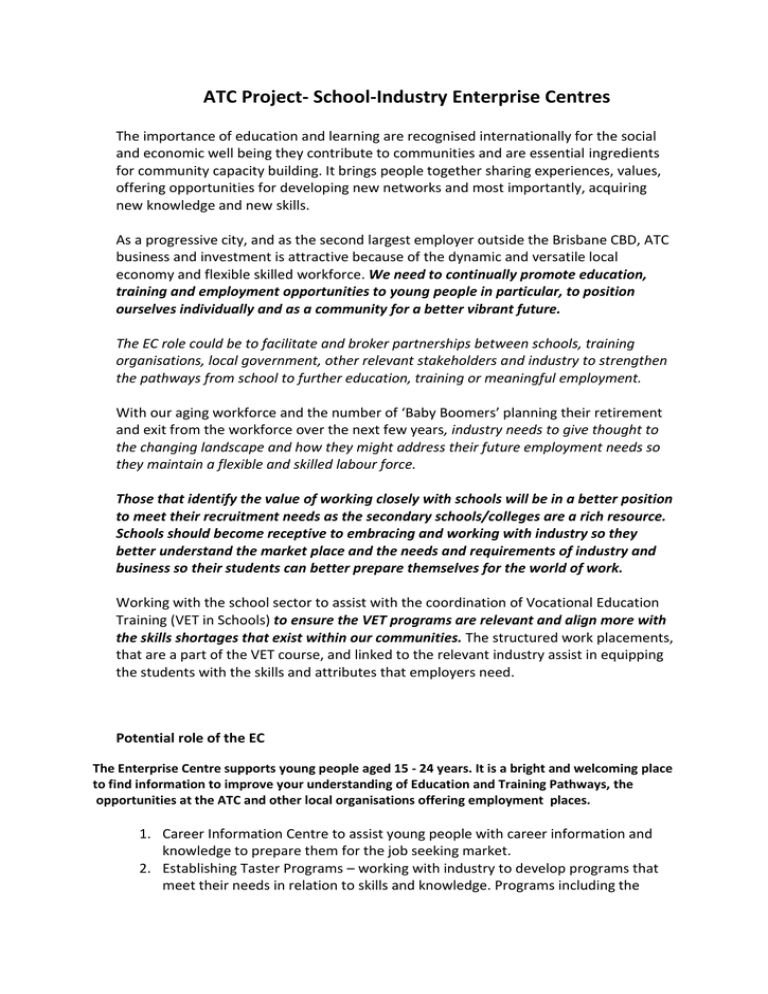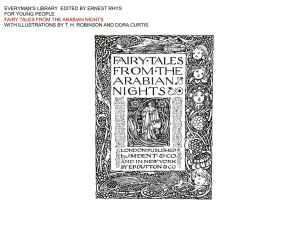ATC Project- School-Industry Enterprise Centres
advertisement

ATC Project- School-Industry Enterprise Centres The importance of education and learning are recognised internationally for the social and economic well being they contribute to communities and are essential ingredients for community capacity building. It brings people together sharing experiences, values, offering opportunities for developing new networks and most importantly, acquiring new knowledge and new skills. As a progressive city, and as the second largest employer outside the Brisbane CBD, ATC business and investment is attractive because of the dynamic and versatile local economy and flexible skilled workforce. We need to continually promote education, training and employment opportunities to young people in particular, to position ourselves individually and as a community for a better vibrant future. The EC role could be to facilitate and broker partnerships between schools, training organisations, local government, other relevant stakeholders and industry to strengthen the pathways from school to further education, training or meaningful employment. With our aging workforce and the number of ‘Baby Boomers’ planning their retirement and exit from the workforce over the next few years, industry needs to give thought to the changing landscape and how they might address their future employment needs so they maintain a flexible and skilled labour force. Those that identify the value of working closely with schools will be in a better position to meet their recruitment needs as the secondary schools/colleges are a rich resource. Schools should become receptive to embracing and working with industry so they better understand the market place and the needs and requirements of industry and business so their students can better prepare themselves for the world of work. Working with the school sector to assist with the coordination of Vocational Education Training (VET in Schools) to ensure the VET programs are relevant and align more with the skills shortages that exist within our communities. The structured work placements, that are a part of the VET course, and linked to the relevant industry assist in equipping the students with the skills and attributes that employers need. Potential role of the EC The Enterprise Centre supports young people aged 15 - 24 years. It is a bright and welcoming place to find information to improve your understanding of Education and Training Pathways, the opportunities at the ATC and other local organisations offering employment places. 1. Career Information Centre to assist young people with career information and knowledge to prepare them for the job seeking market. 2. Establishing Taster Programs – working with industry to develop programs that meet their needs in relation to skills and knowledge. Programs including the Australian Industry Group Engineering Taster, the Pharmacy Assistant/Retail Taster, the Bricklaying Taster in partnership with the Australian Block & Bricklaying. 3. Coordination of the school Based New Apprenticeship Program where students can combine schooling with a part-time apprenticeship/traineeship. 4. Facilitating Career Voyage workshops working with a range of students producing action plans about possible career choices and contacting these students when a job of choice is identified. Career Voyage Career Voyage is a comprehensive career guidance tool used by accredited career practitioners. The program leads clients through a systematic decision making process. It broadens horizons by looking at the whole range of occupations. Sometimes the jobs suggested confirm a client's existing ideas and provide backup by listing similar jobs. For other clients, the program often suggests jobs not heard of or not previously considered. Career Voyage takes clients through a four stage process: 1. Section Choice Clients choose the appropriate level of education and training by selecting one of five levels. These levels range from minimum education and training to university graduate level. The language used, items presented and jobs suggested have been thoroughly researched to suit each level. 2. Occupational Interest Guide An interactive questionnaire asks clients about their occupational interests as they relate to the world of work. An occupational interest profile is produced for each client with clear, specific and supportive graphical and text information. The practitioner can enter the Adviser screen and check the client's results for problems needing attention. The Adviser report outlines any particular concerns and suggests appropriate courses of action. Printable interest profile reports for both client and adviser are available. 3. Job Suggestions The client moves on to a second interactive questionnaire involving a further eighty job factors (including working conditions, health, talents, working hours, etc). Completion of this section leads to twenty job suggestions for all clients, based on what they have said about themselves. Each job suggestion has key information about that job. 4. Research and Action Planning Using software features such as "Pros and Cons" of each job,” Similar Jobs", "Other Jobs" (i.e. those not originally listed as suggestions), the client can interrogate the jobs database and develop realistic career plans. Access to ‘Ozjac’ and ‘myfuture’ are also available for more comprehensive job-specific information and education and training requirements. Career voyage is a computer based program that profiles your interests by asking you questions about what you like and dislike, and what working environment you could see yourself working in. It then lists 40 jobs that match your interest profile. The best part about career voyage is that it covers all types of jobs, allowing you to research the careers you are interested in, and helps you to plan what steps you need to take for you to get started on that career path. 5. Sponsor industry/education breakfasts where both parties can discuss in an informal manner how they can work closely together to create mutually beneficial outcomes. 6. Promoting Manufacturing Week and facilitating school/industry tours, Mindshop Excellence programs all focussed on school to employment transitions and industry/market place knowledge. 7. Innovative programs that will assist our young people in making the transition from school to work or further education. Committee of Management should be formed from a diverse range of stakeholder organisations including Employer Peak Bodies, Local Government, TAFE/Universities, Adult Community Education, Schools, Community Trade Unions and Other Educational & Training organisations. Examples of the resources available include: Computers – resume updating and printing Study space Information on a variety of local services available to you Information on courses, TAFE Colleges, RTO’s Universities, Short courses Volunteer work Job Network Agencies and New Apprenticeship Centres Support during Job search Information on interview technique Fax, phone, internet and general assistance for job search Ongoing contact via ONTRACK connect once you have left school The EC could also have links with other agencies that can be accessed including: BYS - Brisbane Youth Services Centrelink JSA’s SEEK .com Studyfinder AAC’s ULDA ISC’s TMc 9/8/1


